In 1975, visually impaired skiing officially came to the United States – and Summit County – for the first time with Ski for Light, a cross-country skiing event for blind athletes that was modeled after the infamous Ridderrennet in Norway. Gene Dayton, one of Breckenridge Outdoor Education Center’s (BOEC) original founders, was heavily involved in bringing this event to Colorado, initiating what would ultimately become the BOEC and the formation of one of the first blind skiing programs in the country. Since then, thousands of individuals with blindness and visual impairments have received instruction from BOEC’s talented instructors, including Kevin Brown, blind athlete and recent participant. This is his story as an athlete and skier with the BOEC.
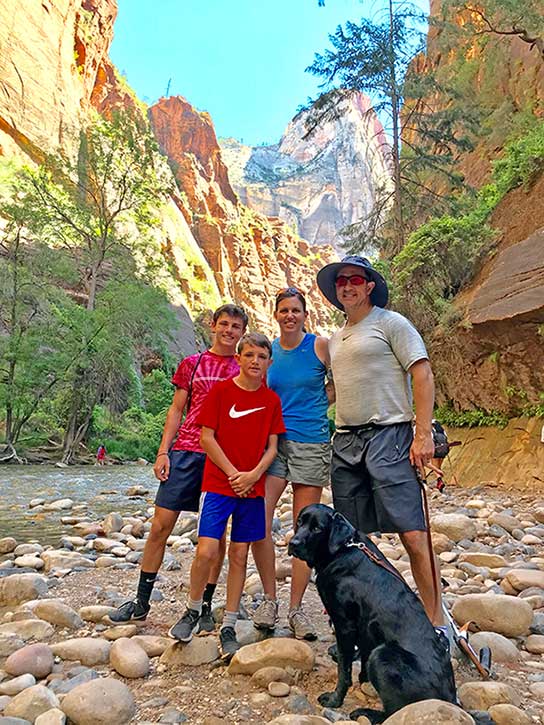 Kevin was born into a military family that moved from place to place until he was seven years old, when they finally settled down in the Washington, D.C. area. This was the same time that Kevin was diagnosed with Stargardt’s (which was later correctly diagnosed as cone-rod dystrophy), a genetic defect that causes progressive vision loss in the cones (center vision) and rods (peripheral vision) of both eyes. For most of his childhood, Kevin, legally blind, was faced with the obstacle of relying solely on his peripheral vision to perform everyday activities. He didn’t let that stop him, though, as he continued to function the same as everybody else.
Kevin was born into a military family that moved from place to place until he was seven years old, when they finally settled down in the Washington, D.C. area. This was the same time that Kevin was diagnosed with Stargardt’s (which was later correctly diagnosed as cone-rod dystrophy), a genetic defect that causes progressive vision loss in the cones (center vision) and rods (peripheral vision) of both eyes. For most of his childhood, Kevin, legally blind, was faced with the obstacle of relying solely on his peripheral vision to perform everyday activities. He didn’t let that stop him, though, as he continued to function the same as everybody else.
“When I was seven years old, I just didn’t know,” remembers Kevin. “All you know is what you know. The concepts of visual difference, although they were apparent, I just read closer than everybody else or I sat in the front of the classroom. Obviously, there was a difference, but I didn’t recognize it as I was still learning the same material. So, I kind of compartmentalized it, and it didn’t really matter to me.”
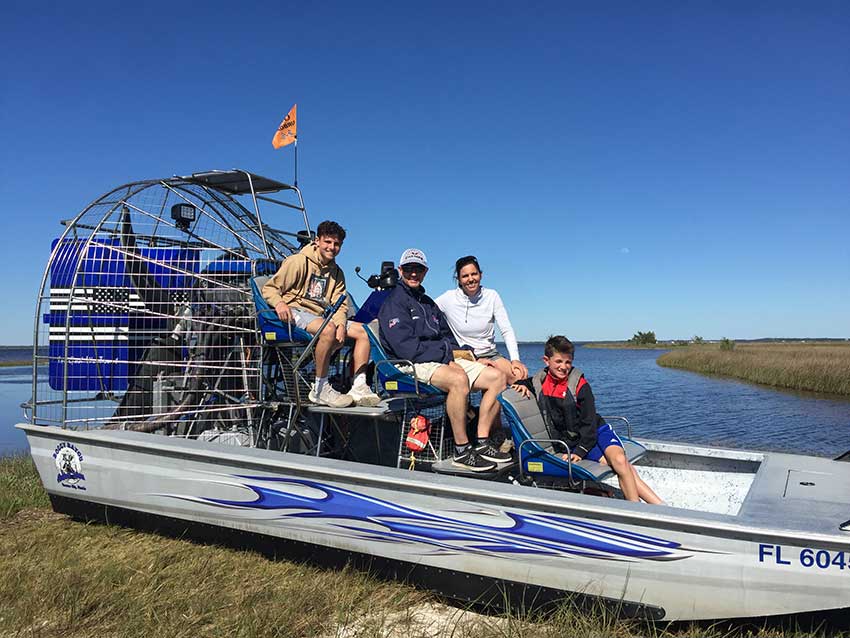
Kevin and family pose on an air boat.
Now living in the Northern Virginia suburbs of D.C. where the competitive nature of athletics is paramount, Kevin, just like every other kid out there, participated in a variety of sports despite his diagnosis. His brother, three years older, provided an impetus for him to excel as the competition with the older kids – combined with his visual disparity – forced him to work harder than everyone else to succeed. This started a novel approach to living life that would ultimately serve useful as he got older and his vision continued to deteriorate.
“I wanted to do everything that my older brother could do,” Kevin says. “No one would have ever noticed at the time that there was any difference between me and somebody else other than I had those Coke bottle glasses at seven years old.”
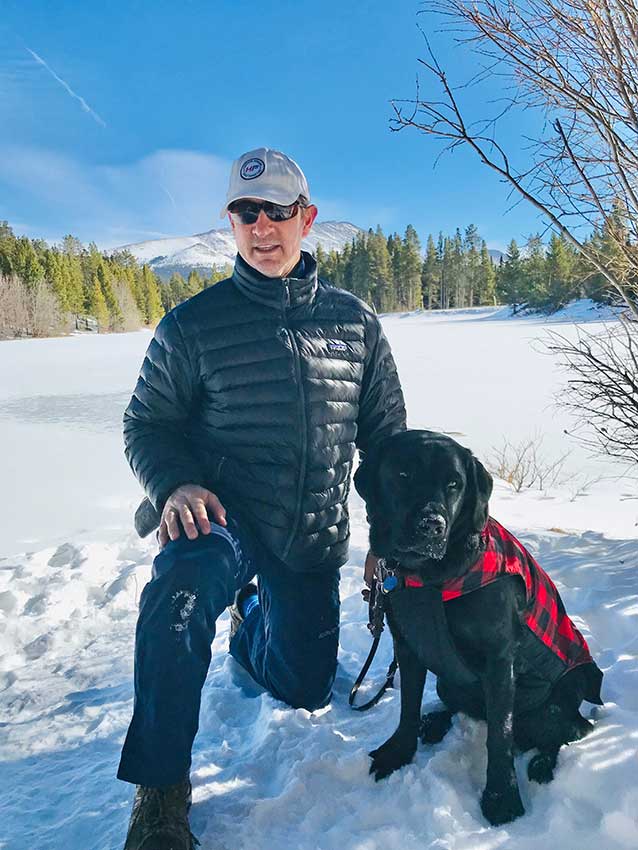
Kevin and his guide dog Weaver in Breckenridge.
As Kevin entered high school and his vision continued to decline, the natural athlete and competitor in him didn’t let that stop him from being active in soccer, track & field, basketball and “every other neighborhood sport you can imagine.” By this point he was competitive enough, athletic enough, and had the speed and quickness to make up for his disability. Even more importantly, Kevin had a network of support in his family and friends that encouraged him to work harder than everyone else.
“I was so fortunate at the time to have a support system that prodded me in not only sports but the game of life,” says Kevin. “Without that foundation, I wouldn’t be where I am today.”
The same pattern continued for the 18-year-old Kevin when he enrolled in college at the University of Virginia as he dabbled predominantly in intramural sports. However, his vision had by now started to deteriorate to the point where participating in “normal” sports became more difficult. An internship with the U.S. Department of the Treasury at the Bureau of Engraving and Printing helped to keep his mind sharp, but his competitive nature just couldn’t let go of participating in sports. At 26 years old, Kevin found out about blind sports and the rest is history.
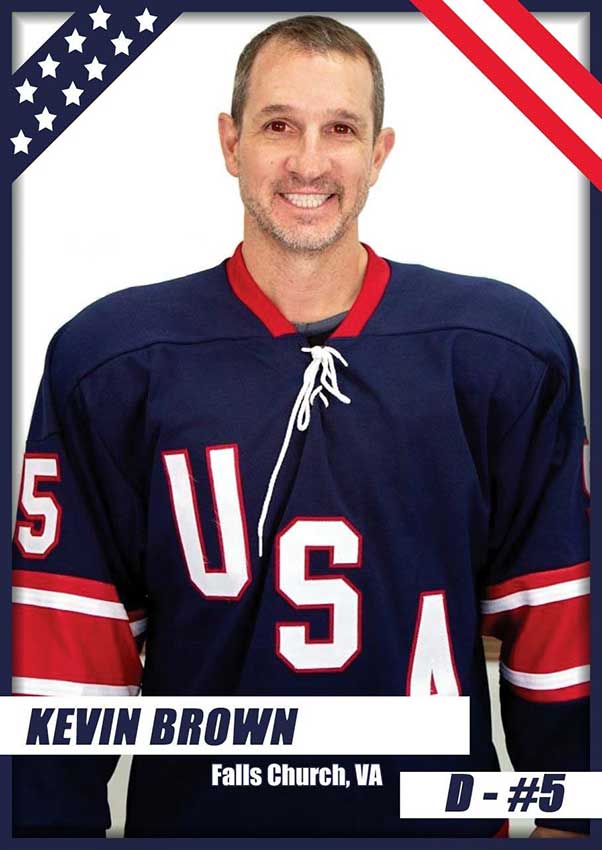
Kevin Brown, defenseman for the U.S. Blind Hockey Team. Photo courtesy of U.S. Blind Hockey.
Kevin began competing for the United States Association of Blind Athletes (USABA), breaking a record in track and field in the pentathlon in the process, while staying active in whatever way he could. His vision took a couple more turns for the worse as he neared age 45 and that’s when he found out about blind hockey with the U.S. Blind Hockey Team. He was now no longer considered legally blind, he was considered fully blind. But once again, he wasn’t going to let that stop him from staying active. He took a chance at hockey and a year after his first practice with the squad, he made the first national team and has been participating with them ever since.
“It’s been a really enjoyable experience that keeps me engaged and somewhat nostalgic,” he says. “All the happiness and enjoyment from playing as a kid … I get to do it again. But I get to do it with teammates that are sometimes much younger than me. They keep me young, motivated, competitive and certainly humbled.”
Now 50 years old, Kevin has a family of his own, but we would expect nothing less than his wife Eileen and boys, Jack (18) and Henry (14), to push dad in the same manner as his nuclear family before them. A planned family trip to Colorado would open the next chapter of his sports “career” when they decided upon a visit to Breckenridge so the boys could ski something other than the east coast for the first time and Kevin could participate in the Adaptive Ski & Snowboard Program with the BOEC.

Kevin blocks a shot for Team USA. Photo courtesy of U.S. Blind Hockey.
Kevin skied as a kid, a handful of times in college, a few times with Eileen before the kids were born and once with an adaptive organization on the east coast. But this was really his first time skiing in an “official” capacity with a guide, something he had mixed feelings about in the beginning.
“It had been a number of years since I had skied, so I was a bit nervous, but excited at the same time,” Kevin says. “It was something I didn’t think I would get to experience again. The warmth that the BOEC welcomed me with took away some of that nervousness right away.”
It also helped that Kevin’s motto of “I’m not afraid to fail, I’m afraid not to try” rose to the surface. He was paired with seasoned instructor, Alison Myers, and Intern Katie Kosnak and immediately got to work. Kevin’s natural athleticism was evident right away as Alison began teaching parallel turns and pole plants just like she would have taught any skier in ski school.
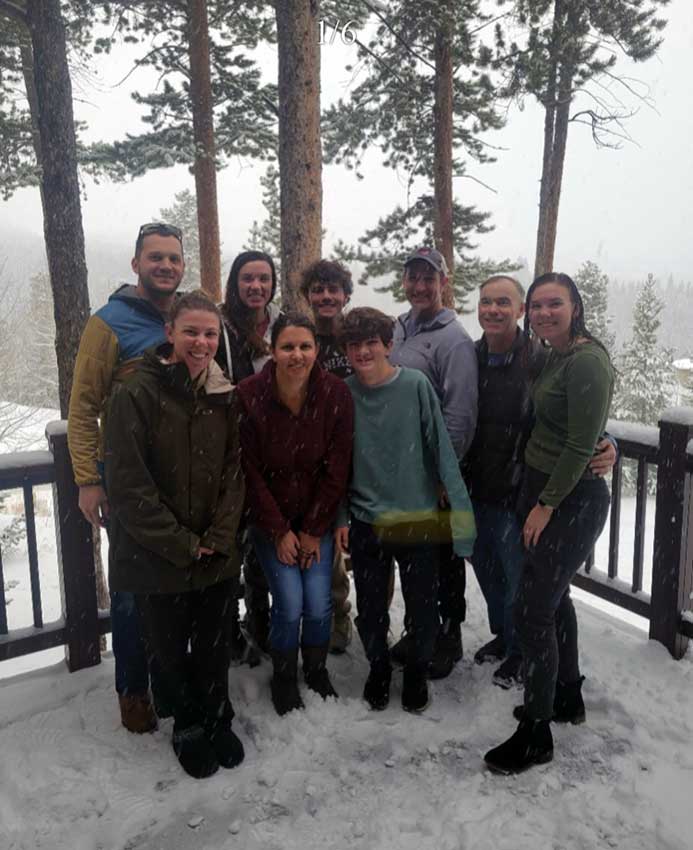
Kevin and his extended family in Breckenridge.
“I could tell right away that Kevin is an accomplished skier,” says Myers. “So he did not necessarily require a lesson, per se, or want to work on skill development, which allowed me to focus on guiding him safely. The rhythm of our turns is what I remember most, because it was SO MUCH FUN to ski together. I am still smiling with the memories of two great days.”
“Her (Alison’s) voice had a presence out there on the hill,” reminisces Kevin. “So, it was just left, right, stop. It was very casual and free flowing. It felt like it was just the two of us out there. Alison’s ability to effectively coach and communicate was very powerful and created confidence very quickly. And she did it with such confidence and grace that it became just fun.”
This symmetry with Alison, and an amazing, enjoyable afternoon of skiing, convinced Kevin to book a second day of lessons and this time BOEC volunteer Stacie Jones joined the team. Immediately, Stacie was impressed.
“Probably my favorite lesson to date,” she says. “He was so beautiful skiing down the hill at a regular pace, guided only by Allison’s voice. He was truly skiing on his own again. He didn’t think he would be able to do it. I was so blessed to witness it. The man is incredible.”

Kevin Brown poses with Adaptive Ski Instructor Alison Myers (left) and Volunteer Stacie Jones (right).
And Kevin was just as impressed by his counterparts. He says, “We’re out there and I’m skiing with two people, some strangers that were immediately welcoming and gave me so much confidence. It restores some of that youth and it reminded me of going down the hill as a child. I had a bunch of positive feelings and at one point I was going down the hill and I had tears of joy in my eyes. To do it somewhat freely, I felt myself laughing and giggling too!”
That sense of freedom on the slopes is what really piqued his interest. Kevin’s hockey background was evident in how he was a natural at making turns and completing the “hockey stop,” but that’s where the correlations stop. In blind hockey, one generally knows his bearings of where the goalie is, where the bench is and where his teammates are, but when you have the unexpected variances of the ski slopes, you can throw all that out the window. You are truly free, a concept that can be both exhilarating and nail-biting for the blind athlete.
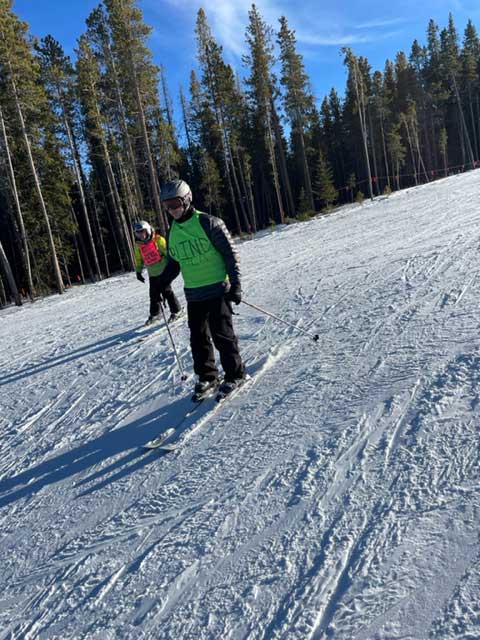
Kevin tackles the slopes of Breckenridge Ski Resort.
“I started off with every muscle flexed trying to prepare for what may happen,” says Kevin. “But as the day went forward and Alison continued to provide that calming presence, I just got that much more comfortable and relaxed. It’s so hard to explain how it feels, I just felt open and free. With skiing you have an open landscape, your own canvas to paint if you will. As far as I’m concerned, it was just me and my guides having a nice run down the mountain.”
Kevin, who in his professional life has been the Director of Marketing for the Bureau of Engraving and Printing for the past 27 years, is quick to talk about his experience with the BOEC in hopes of inspiring others to do the same.
“Just do it,” he says. “Don’t be afraid to fail, don’t be afraid to fall, just be afraid not to try. Be afraid not to get that experience. We’ve all got limited time on this Earth so don’t miss out. Embrace every challenge. Don’t let other people’s perceptions limit you. Be engaged and participate in life fully. And appreciate those that are willing to help out because we all need help at some point in time. The more we are engaged in that process, I think we are all better served.”

Kevin skis with Alison Myers, adaptive instructor, close behind.
And as far as his overall experience with the BOEC, we may have created a lifer out of Kevin.
“My experience brought back not only fond memories, but created new ones,” he says. “It also gives me hope to do it again and I look forward to the opportunity to continue to be a part of the BOEC in the future. I’ve been so fortunate that so many opportunities have presented themselves to me that have created longtime relationships, so I hope this is just the beginning with the BOEC.”
It sounds like we will be seeing more of Kevin Brown out on the slopes of Breckenridge Ski Resort in the future. However, in the meantime, he is actively pursuing blind soccer with USABA and possibly a spot on the U.S. team which will participate in the 2028 Paralympic Games.
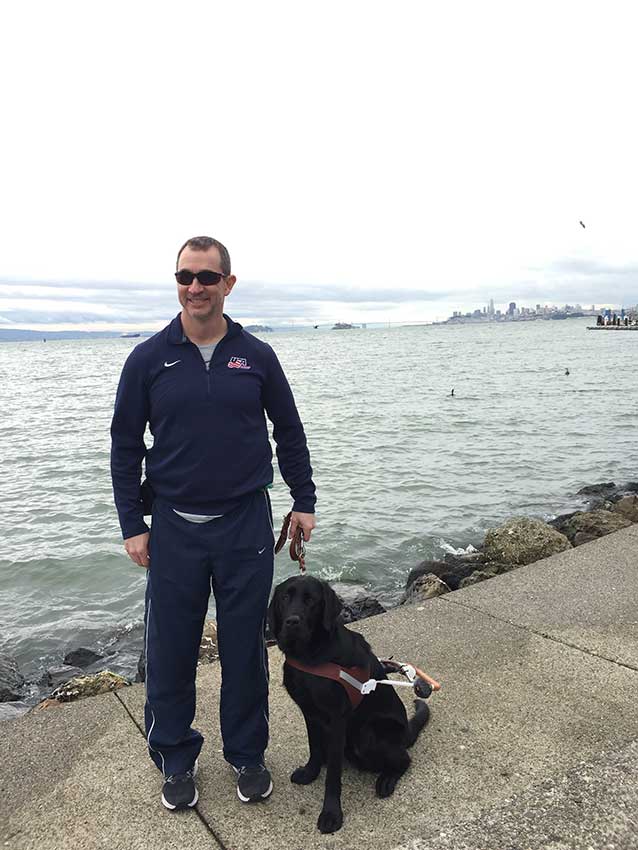
Kevin and Weaver.
“Every time my vision seems to get a little bit worse, a new door opens that has all these wonderful opportunities,” he says. “While you might be disappointed that you can’t see smiles anymore, you can now feel them and so you figure out a way to make that experience, although it may be depressing at first, there’s a lot of opportunities on the other side that are filled with joy. And it’s programs like the BOEC that help create that. I cannot thank you enough for how accommodating the program is. It was turnkey. It was a breeze.”


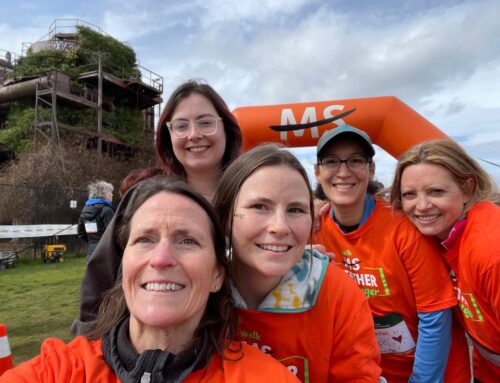
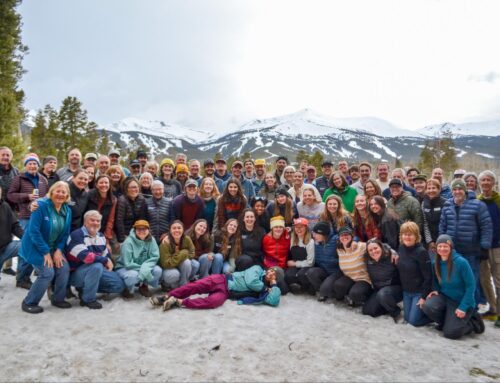

Kevin Brown is my cousin and while I was growing up I always looked up to him. He is so talented, driven and a true leader. I am so proud of Kevin in all that he has accomplished. I can’t wait to see you open your next door.
Wendi Markley